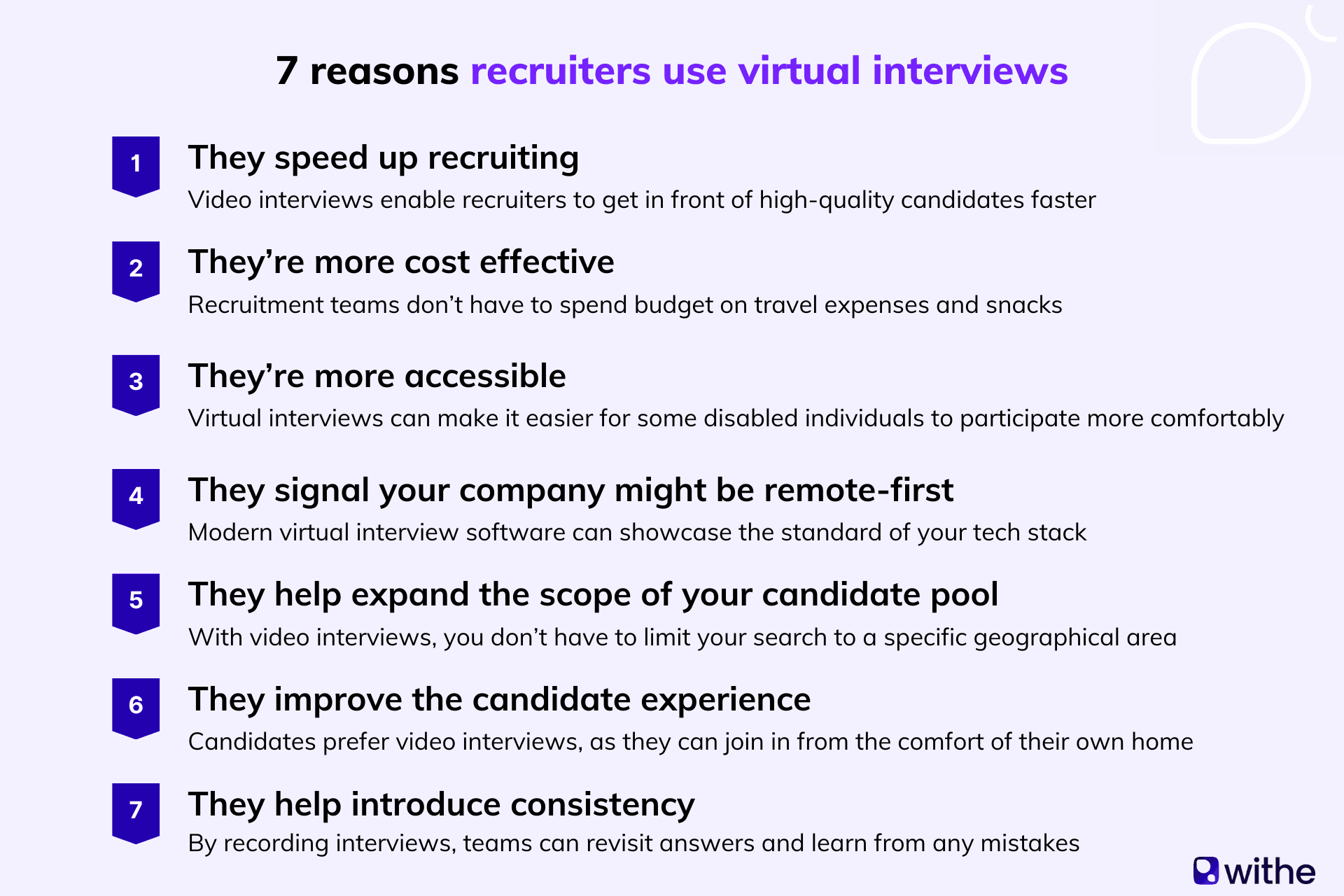Leverage Withe's hiring event platform
Streamline your seasonal and high-volume hiring process and hit your hiring targets.
In their 2018 Global Recruiting Trends report, LinkedIn predicted that virtual interviews would be one of five future disruptors in the job interview process — and they were right. Fast forward a few years, and the impact of the COVID-19 pandemic and rapid digitization have made video interviews a staple of the recruitment space. This technology allowed recruiters to continue hiring during lockdowns and has been key in establishing remote and hybrid workforces.
Beyond being inherently more convenient for candidates and recruiters alike, virtual interviewing offers a number of advantages. We explore seven of them below — take a look!
Leverage Withe's hiring event platform
Streamline your seasonal and high-volume hiring process and hit your hiring targets.
1. They speed up the recruitment process
Being able to move fast has become vitally important for recruitment teams. It’s why hiring efficiency is a core focus area for many recruitment leaders. With the best candidates only spending an average of ten days on the market, there’s a lot of value in being able to talk to a promising candidate quickly.
Virtual interviews can help make this happen. Rather than juggling schedules to figure out when you can get multiple people in the same room at the same time, you get to remove the location factor altogether. Instead, virtual interviews can provide more flexibility, allowing individuals to call in from anywhere with an internet connection. With this flexibility, recruiters can talk to candidates faster and move them along the hiring journey more efficiently.
The speed factor is especially true with on-demand video interviews, which helps recruiters get in front of candidates almost immediately, without the hassle of scheduling. These solutions are best leveraged for high-volume hiring scenarios that require the ability to talk to multiple candidates quickly and at scale.
2. They’re more cost effective
When in-person interviews were the norm, a big chunk of the recruitment team’s budget would be spent paying for coffees and expensing travel to and from the office. Plus, recruiters would have to take up office space that could be otherwise dedicated to core business activities. With virtual interviews, however, teams only have to invest in the software they use to have conversations with candidates.
In addition, video interview software makes it easier for recruiters to run more interviews in a shorter amount of time, which can help keep the recruitment team lean.
3. They’re more accessible
Compared to in-person interviews, virtual interviews make it much easier to accommodate disabled candidates, and thus widen the talent pool even further. For example, people with physical disabilities can interview from the comfort of their own home in a set up that makes sense for them. Some modern video interview solutions offer or integrate with closed captioning tools for those with hearing impairments. Alternatively, for deaf candidates, a virtual interview makes it easier to include an interpreter, as some cities or regions may not have many available to hire on short notice.
4. They signal that your company might be hybrid or remote
In September 2022, only 14% of job postings were for remote roles — but they received 52% of all applications. Candidates increasingly want remote work, and how you interview them is a good way to signal how equipped your company is to offer remote or hybrid opportunities.
Virtual interviews that leverage strong, recognizable software and provide seamless candidate experiences are a great way to showcase the standard of your company’s remote-forward tech stack.
5. They help expand the scope of your candidate pool
With video interviews, you don’t have to limit your candidate search to a limited geographic area. Instead, video interviews can make your recruiters more accessible and speak to potential candidates from other cities, regions, or even countries. In a time where available talent is limited for many industries, this is a particularly important benefit.
6. They improve the candidate experience
Today, a positive candidate experience can go a long way towards growing your offer acceptance rate and reducing your time to fill. A modern, easy to use video interview process can help by providing candidates with a conversation they can attend comfortably from home, without the stress of a new environment. Plus, candidates will attribute easy and comfortable experiences with your employer brand, making them more likely to accept an offer when the time comes and then refer you to other candidates.
7. They help introduce consistency
The great thing about virtual interviews is that you can record them for reference — with permission from the candidate, of course. This enables a number of things. Firstly, it allows interviewers to look back on answers rather than relying on their note taking. Second, recordings allow leaders to look back on how interviews are being conducted and make decisions on what needs to change or stay the same, and implement mandates across the team. Lastly, it also allows for hiring managers or recruiters who weren’t able to attend the call to review the interview and make their own assessment of the candidate.

Virtual interviews empower recruiters
Over the last few years, leaders in the recruitment space have been rapidly adopting new technologies and solutions to make their teams faster and more efficient. As they continue to build and refine their recruitment tech stacks, video interview software is bound to remain a vital component.
At Withe, we’re helping high-volume recruiters enhance their efforts with our on-demand video interview software. Learn how on our home page.




